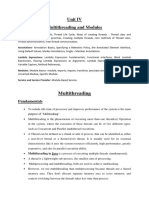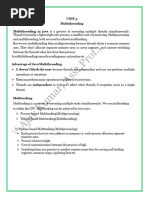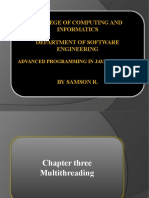Multi Threading
Uploaded by
ROSHAN YADAVMulti Threading
Uploaded by
ROSHAN YADAVObject Oriented Programming using
JAVA (Professional Elective-1)
Course Code: CS1529
Course Instructor: Dr. Ashish Kumar Sahu
Department of Computer Science and Engineering National Institute of Technology Jamshedpur 1
Multithreading
Introduction
Multithreading in Java is a process of executing multiple threads
simultaneously.
A thread is a lightweight sub-process, the smallest unit of processing.
Multiprocessing and multithreading, both are used to achieve
multitasking.
However, we use multithreading than multiprocessing because threads
use a shared memory area. They don't allocate separate memory area so
saves memory, and context-switching between the threads takes less
time than process.
Department of Computer Science and Engineering National Institute of Technology Jamshedpur 3
Advantages of Java Multithreading
It doesn't block the user because threads are independent and you can
perform multiple operations at the same time.
You can perform many operations together, so it saves time.
Threads are independent, so it doesn't affect other threads if an
exception occurs in a single thread.
Department of Computer Science and Engineering National Institute of Technology Jamshedpur 4
Multitasking
Multitasking is a process of executing multiple tasks simultaneously. We
use multitasking to utilize the CPU.
Multitasking can be achieved in two ways:
1. Process-based Multitasking (Multiprocessing)
2. Thread-based Multitasking (Multithreading)
Department of Computer Science and Engineering National Institute of Technology Jamshedpur 5
Process-based Multitasking (Multiprocessing)
Each process has an address in memory. In other words, each process
allocates a separate memory area.
A process is heavy weight.
Cost of communication between the process is high.
Switching from one process to another requires some time for saving
and loading registers, memory maps, updating lists, etc.
Department of Computer Science and Engineering National Institute of Technology Jamshedpur 6
Thread-based Multitasking (Multithreading)
Threads share the same address space.
A thread is lightweight.
Cost of communication between the thread is low.
A thread is a lightweight subprocess, the smallest unit of processing. It is a separate path of execution.
Threads are independent. If there occurs exception in one thread, it doesn't affect other threads. It
uses a shared memory area.
Department of Computer Science and Engineering National Institute of Technology Jamshedpur 7
Department of Computer Science and Engineering National Institute of Technology Jamshedpur 8
Java Thread class
Java provides Thread class to achieve thread programming.
Thread class provides constructors and methods to create and perform operations on a thread.
Modifier and Type Method Description
void start() It is used to start the execution of the thread.
void run() It is used to do an action for a thread.
static void sleep() It sleeps a thread for the specified amount of time.
static Thread currentThread() It returns a reference to the currently executing thread object.
void join() It waits for a thread to die.
int getPriority() It returns the priority of the thread.
void setPriority() It changes the priority of the thread.
String getName() It returns the name of the thread.
void setName() It changes the name of the thread.
long getId() It returns the id of the thread.
Department of Computer Science and Engineering National Institute of Technology Jamshedpur 9
boolean isAlive() It tests if the thread is alive.
static void yield() It causes the currently executing thread object to pause and allow other threads to execute temporarily.
void suspend() It is used to suspend the thread.
void resume() It is used to resume the suspended thread.
void stop() It is used to stop the thread.
void destroy() It is used to destroy the thread group and all of its subgroups.
boolean isDaemon() It tests if the thread is a daemon thread.
void setDaemon() It marks the thread as daemon or user thread.
void interrupt() It interrupts the thread.
boolean isinterrupted() It tests whether the thread has been interrupted.
static boolean interrupted() It tests whether the current thread has been interrupted.
static int activeCount() It returns the number of active threads in the current thread's thread group.
void checkAccess() It determines if the currently running thread has permission to modify the thread.
static boolean holdLock() It returns true if and only if the current thread holds the monitor lock on the specified object.
static void dumpStack() It is used to print a stack trace of the current thread to the standard error stream.
Department of Computer Science and Engineering National Institute of Technology Jamshedpur 10
Life cycle of a Thread (Thread States)
In Java, a thread always exists in any one of the following states. These
states are:
1. New
2. Active
3. Blocked / Waiting
4. Timed Waiting
5. Terminated
Department of Computer Science and Engineering National Institute of Technology Jamshedpur 11
1. New: Whenever a new thread is created, it is always in the new
state. For a thread in the new state, the code has not been run yet and
thus has not begun its execution.
2. Active: When a thread invokes the start() method, it moves from the
new state to the active state. The active state contains two states
within it: one is runnable, and the other is running.
Department of Computer Science and Engineering National Institute of Technology Jamshedpur 12
1. Runnable: A thread, that is ready to run is then moved to the runnable state.
In the runnable state, the thread may be running or may be ready to run at
any given instant of time. It is the duty of the thread scheduler to provide the
thread time to run, i.e., moving the thread the running state.
2. Running: When the thread gets the CPU, it moves from the
runnable to the running state. Generally, the most common
change in the state of a thread is from runnable to running and
again back to runnable.
3. Blocked or Waiting: Whenever a thread is inactive for a span of
time (not permanently) then, either the thread is in the blocked state
or is in the waiting state.
Department of Computer Science and Engineering National Institute of Technology Jamshedpur 13
4. Timed Waiting: A thread is in TIMED_WAITING state when it's
waiting for another thread to perform a particular action within a
stipulated amount of time.
5. Terminated: A thread reaches the termination state because of the
following reasons:
1. When a thread has finished its job, then it exists or terminates normally.
2. Abnormal termination: It occurs when some unusual events such as an
unhandled exception or segmentation fault
Department of Computer Science and Engineering National Institute of Technology Jamshedpur 14
Department of Computer Science and Engineering National Institute of Technology Jamshedpur 15
Implementation of Thread States
The java.lang.Thread.State class of Java provides the constants
ENUM to represent the state of a thread. These constants are:
public static final Thread.State state_name
state_name {NEW, RUNNABLE, BLOCKED , WAITING,
TIMED_WAITING , TERMINATED}
Department of Computer Science and Engineering National Institute of Technology Jamshedpur 16
Java Threads
There are two ways to create a thread:
1. By extending Thread class
2. By implementing Runnable interface.
Department of Computer Science and Engineering National Institute of Technology Jamshedpur 17
1. Thread class
Thread class provide constructors and methods to create and perform
operations on a thread.
Commonly used Constructors of Thread class:
• Thread()
• Thread(String name)
• Thread(Runnable r)
• Thread(Runnable r, String name)
Department of Computer Science and Engineering National Institute of Technology Jamshedpur 18
public void run(): is used to perform action for a thread.
public void start(): starts the execution of the thread.JVM calls the run() method on the thread.
public void sleep(long milliseconds): Causes the currently executing thread to sleep (temporarily
cease execution) for the specified number of milliseconds.
public void join(): waits for a thread to die.
public void join(long miliseconds): waits for a thread to die for the specified milliseconds.
public int getPriority(): returns the priority of the thread.
public int setPriority(int priority): changes the priority of the thread.
public String getName(): returns the name of the thread.
public void setName(String name): changes the name of the thread.
public Thread currentThread(): returns the reference of currently executing thread.
Department of Computer Science and Engineering National Institute of Technology Jamshedpur 19
public int getId(): returns the id of the thread.
public Thread.State getState(): returns the state of the thread.
public boolean isAlive(): tests if the thread is alive.
public void yield(): causes the currently executing thread object to temporarily pause and allow
other threads to execute.
public void suspend(): is used to suspend the thread(depricated).
public void resume(): is used to resume the suspended thread(depricated).
public void stop(): is used to stop the thread(depricated).
public boolean isDaemon(): tests if the thread is a daemon thread.
public void setDaemon(boolean b): marks the thread as daemon or user thread.
public void interrupt(): interrupts the thread.
Department of Computer Science and Engineering National Institute of Technology Jamshedpur 20
2. Runnable interface:
The Runnable interface should be implemented by any class whose
instances are intended to be executed by a thread. Runnable interface
have only one method named run().
public void run(): is used to perform action for a thread.
Department of Computer Science and Engineering National Institute of Technology Jamshedpur 21
You might also like
- Java Multithreading Interview Questions And AnswersFrom EverandJava Multithreading Interview Questions And AnswersNo ratings yet
- Java Programming Chapter 5 Multithreading DetailNo ratings yetJava Programming Chapter 5 Multithreading Detail19 pages
- (IJCST-V3I2P5) : Nikita Goel, Vijaya Laxmi, Ankur SaxenaNo ratings yet(IJCST-V3I2P5) : Nikita Goel, Vijaya Laxmi, Ankur Saxena8 pages
- E-Notes_790_Content_Document_20240917091004PMNo ratings yetE-Notes_790_Content_Document_20240917091004PM40 pages
- 25 Introduction On Multithreading, Life Cycle of A Thread 05 Sep 2020material - I - 05 Sep 2020 - Lecture13 Multithreading - in - JavaNo ratings yet25 Introduction On Multithreading, Life Cycle of A Thread 05 Sep 2020material - I - 05 Sep 2020 - Lecture13 Multithreading - in - Java26 pages
- Chapter 2 - Multithreading - PPTX (Autosaved)No ratings yetChapter 2 - Multithreading - PPTX (Autosaved)46 pages
- Concurrent Programming in Java: Mrs. S.S.Jamsandekar Department of Computer Science Shivaji UniversityNo ratings yetConcurrent Programming in Java: Mrs. S.S.Jamsandekar Department of Computer Science Shivaji University27 pages
- Chapter 2 - Multithreading - PPTX (Autosaved)No ratings yetChapter 2 - Multithreading - PPTX (Autosaved)46 pages
- Https Examinationservices - Nic.in Jeemain23 Downloadadmitcard frmAuthforCity - Aspx appFormId 101032311No ratings yetHttps Examinationservices - Nic.in Jeemain23 Downloadadmitcard frmAuthforCity - Aspx appFormId 1010323111 page
- Notice For Slection of Studetns Council Members - 230201 - 193830No ratings yetNotice For Slection of Studetns Council Members - 230201 - 1938301 page
- Oracle EBS R12 CO Extension For Attachment Mandatory in SSHR Review PageNo ratings yetOracle EBS R12 CO Extension For Attachment Mandatory in SSHR Review Page6 pages
- Standard Chartered Bank (Pakistan) Limited - Electronic Banking Terms and ConditionsNo ratings yetStandard Chartered Bank (Pakistan) Limited - Electronic Banking Terms and Conditions16 pages
- CS1101-DF-Unit 5 - Strings and IterationsNo ratings yetCS1101-DF-Unit 5 - Strings and Iterations7 pages
- Composite Quiz 102 Questions: Type Text To Search Here..No ratings yetComposite Quiz 102 Questions: Type Text To Search Here..36 pages
- Ict Village Proposal: Submitted To: Change MakersNo ratings yetIct Village Proposal: Submitted To: Change Makers4 pages
- Salient Features: Model FL004-0806P FL004-0806R FL004-0806NNo ratings yetSalient Features: Model FL004-0806P FL004-0806R FL004-0806N4 pages
- инструкция-для-кофемашин-servomat-vending machinesteigler-cino-xs-speed-mixнем0% (1)инструкция-для-кофемашин-servomat-vending machinesteigler-cino-xs-speed-mixнем52 pages
- Application Note iMX350 RAPTOR and GOOSE MessagingNo ratings yetApplication Note iMX350 RAPTOR and GOOSE Messaging7 pages
- D5085-Getting Started With ControlWave DesignerNo ratings yetD5085-Getting Started With ControlWave Designer58 pages
- Unit - 2: Evaluation of Mobile System AND Wireless NetworkNo ratings yetUnit - 2: Evaluation of Mobile System AND Wireless Network17 pages
- Department of Computer Science: Compare and Contrast The Common Scheduling Algorithms)No ratings yetDepartment of Computer Science: Compare and Contrast The Common Scheduling Algorithms)4 pages
- Device Load Monitor With Programmable Meter For Energy AuditNo ratings yetDevice Load Monitor With Programmable Meter For Energy Audit3 pages
- Software Release Version 10.6 For Microsoft Windows: Public DocumentationNo ratings yetSoftware Release Version 10.6 For Microsoft Windows: Public Documentation7 pages
- 04 - Verilog Codes For Basic Components (2021f)No ratings yet04 - Verilog Codes For Basic Components (2021f)78 pages
- Java Multithreading Interview Questions And AnswersFrom EverandJava Multithreading Interview Questions And Answers
- (IJCST-V3I2P5) : Nikita Goel, Vijaya Laxmi, Ankur Saxena(IJCST-V3I2P5) : Nikita Goel, Vijaya Laxmi, Ankur Saxena
- 25 Introduction On Multithreading, Life Cycle of A Thread 05 Sep 2020material - I - 05 Sep 2020 - Lecture13 Multithreading - in - Java25 Introduction On Multithreading, Life Cycle of A Thread 05 Sep 2020material - I - 05 Sep 2020 - Lecture13 Multithreading - in - Java
- Concurrent Programming in Java: Mrs. S.S.Jamsandekar Department of Computer Science Shivaji UniversityConcurrent Programming in Java: Mrs. S.S.Jamsandekar Department of Computer Science Shivaji University
- Https Examinationservices - Nic.in Jeemain23 Downloadadmitcard frmAuthforCity - Aspx appFormId 101032311Https Examinationservices - Nic.in Jeemain23 Downloadadmitcard frmAuthforCity - Aspx appFormId 101032311
- Notice For Slection of Studetns Council Members - 230201 - 193830Notice For Slection of Studetns Council Members - 230201 - 193830
- Oracle EBS R12 CO Extension For Attachment Mandatory in SSHR Review PageOracle EBS R12 CO Extension For Attachment Mandatory in SSHR Review Page
- Standard Chartered Bank (Pakistan) Limited - Electronic Banking Terms and ConditionsStandard Chartered Bank (Pakistan) Limited - Electronic Banking Terms and Conditions
- Composite Quiz 102 Questions: Type Text To Search Here..Composite Quiz 102 Questions: Type Text To Search Here..
- Salient Features: Model FL004-0806P FL004-0806R FL004-0806NSalient Features: Model FL004-0806P FL004-0806R FL004-0806N
- инструкция-для-кофемашин-servomat-vending machinesteigler-cino-xs-speed-mixнеминструкция-для-кофемашин-servomat-vending machinesteigler-cino-xs-speed-mixнем
- Application Note iMX350 RAPTOR and GOOSE MessagingApplication Note iMX350 RAPTOR and GOOSE Messaging
- Unit - 2: Evaluation of Mobile System AND Wireless NetworkUnit - 2: Evaluation of Mobile System AND Wireless Network
- Department of Computer Science: Compare and Contrast The Common Scheduling Algorithms)Department of Computer Science: Compare and Contrast The Common Scheduling Algorithms)
- Device Load Monitor With Programmable Meter For Energy AuditDevice Load Monitor With Programmable Meter For Energy Audit
- Software Release Version 10.6 For Microsoft Windows: Public DocumentationSoftware Release Version 10.6 For Microsoft Windows: Public Documentation

































































































